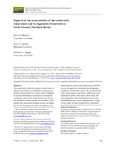Aspects of the sustainability of the camel milk value chain and its regulatory framework in Isiolo County, Northern Kenya

View/
Date
2022-02Author
Machan, Steve N.
Agwata, Jones F.
Oguge, Nicholas O.
Metadata
Show full item recordAbstract
The camel milk value chain plays a critical role as a primary foundation of livelihoods among the pastoralist communities, but it faces a great challenge in control mechanisms to enhance a sustainable marketing system. Our study analyzes the drivers
and processes influencing the sustainability of the camel milk value chain in Isiolo County, northern
Kenya. In this paper, we report on aspects of the characteristics of the value chain players and efficacy of its regulatory frameworks, and propose a model for an enhanced system. We conducted the study using primary data from a field survey and
obtained secondary data from a desk study. We collected primary data through interviews with households using a survey questionnaire. Using a survey guide, we also conducted key informant interviews to supplement the household information. Secondary data was obtained from the literature review. We report that the camel milk value chain has three categories of actors: the micro actors (input suppliers, producers, bulking centers, processors, and marketers), the support services
providers (e.g., extension services, financial institutions), and the policy-makers who shape the enabling environment of the system. Lack of processing capacity and poor institutional coordination among the chain actors and support institutions
were identified as major challenges affecting the sustainability of the camel milk value chain. We present a well-regulated camel milk value chain model for the county with a focus on establishing a camel milk policy to lead to a sustainable system.
